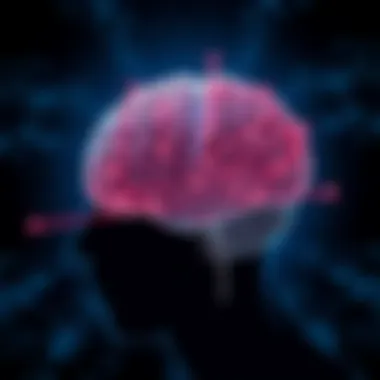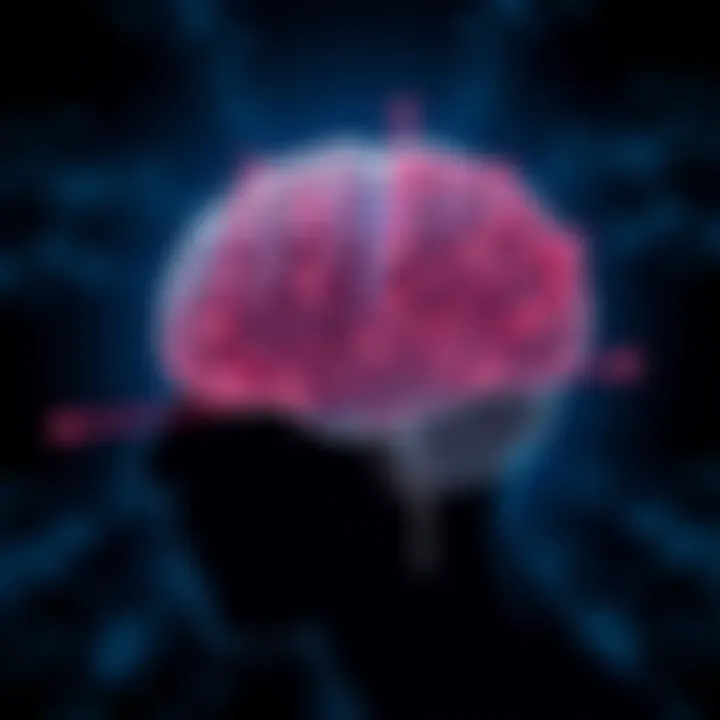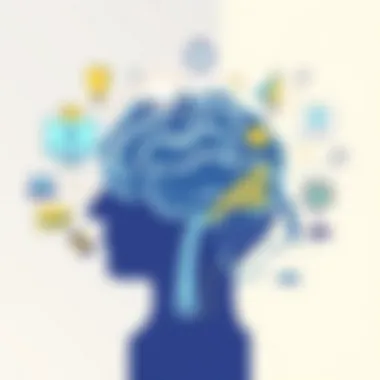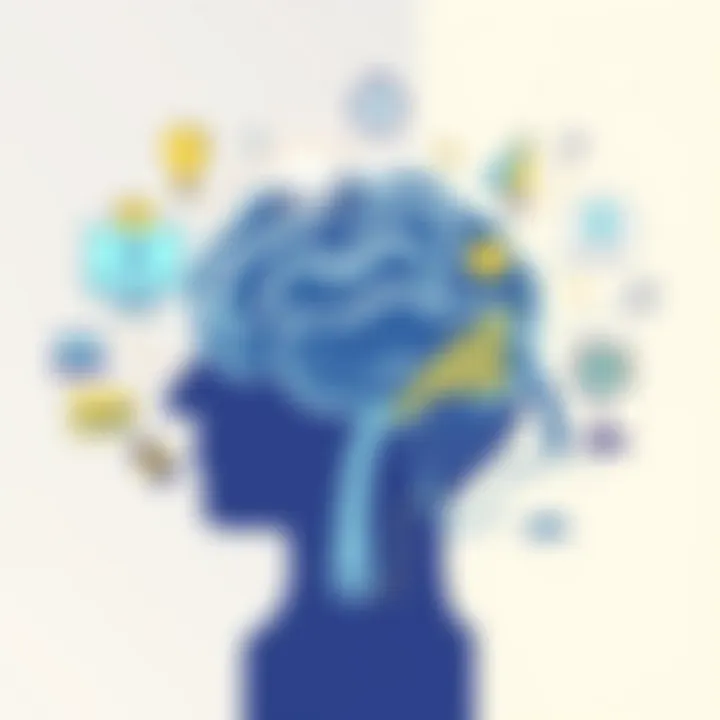Enhancing Memory Skills: Effective Strategies for Growth


Intro
Memory is not just a brain function; it’s the cornerstone of our learning, understanding, and interactions. Every day, we encounter a myriad of information, from casual chats to professional meetings. How we retain and retrieve that information can significantly impact our personal and professional lives. This guide contributes key insights and practical strategies to enhance memory skills, designed for anyone from students pursuing knowledge to professionals advancing in their careers.
The Importance of Memory Skills
In a world teeming with digital distractions, sharpening memory skills is essential. It’s not merely about memorizing facts; it’s about cultivating a sharp cognitive toolkit. By developing robust memory techniques, individuals can improve their ability to process information, solve problems, and make informed decisions. Moreover, a well-honed memory can foster creativity and innovation, enabling one to make connections between disparate ideas and experiences.
Overview of Memory Enhancement Strategies
The techniques discussed in this article will cover various aspects of memory enhancement:
- Mnemonic Devices: Techniques that use patterns and associations to aid memory retention. Whether it's acronyms or visual imagery, these methods can turn mundane facts into memorable stories.
- Lifestyle Choices: Diet, exercise, and sleep are intertwined with cognitive function. Exploring how these elements influence memory can lead to practical lifestyle adjustments.
- Cognitive Training Exercises: Engaging in specific tasks that challenge the brain can strengthen neural connections, enhancing overall memory.
By the end, readers will have a toolkit of strategies to effectively boost memory, paving the way for lifelong learning and professional growth. The journey into memory enhancement begins here!
Understanding Memory Mechanics
Memory is a cornerstone of human cognition. Understanding how memory works is crucial for anyone looking to enhance their memory skills effectively. It provides insight into the processes that govern how we encode, store, and retrieve information.
The mechanics of memory help in identifying not only the strengths and weaknesses of our reminiscence capabilities but also in highlighting techniques that can truly bolster our memory functions. When one grasps the underlying systems at play, sifting through the myriad of memory improvement strategies becomes less daunting. Ultimately, this knowledge arms individuals with the tools needed to consciously engage in practices that can lead to improved retention and recall.
The Nature of Memory
Memory is not merely a database where we file away information. It’s a dynamic and nuanced process that evolves as we interact with our environment. Theoretically, memory involves several stages, from initial perception to subsequent retrieval. It can essentially be divided into the processing elements of encoding, storage, and retrieval, each representing different aspects of how we manage information.
Memory Stages Explained
Memory functions through a series of stages. The first stage is encoding, where information is transformed into a format that can be stored. This is often where individuals can derive meaning from presented information, making it much easier to recall later. The second stage, storage, preserves this information over periods of time. Lastly, retrieval refers to the process of accessing stored information when needed. Misunderstanding any one of these stages can lead to memory gaps, which makes a detailed study of each phase essential for memory enhancement.
Types of Memory
Memory isn't a one-size-fits-all concept. There are several types that serve distinct purposes, primarily categorized into three types: short-term memory, long-term memory, and working memory. Understanding these can play a pivotal role in enhancing cognitive skills.
Short-term Memory
Short-term memory has a limited capacity and is primarily concerned with immediate retention of information. This type of memory is like a post-it note stuck on the fridge – it holds onto data long enough to be useful for a brief period, but once that note is shuffled into a stack, you might forget what it said. The average person can hold about seven items for roughly 20-30 seconds in their short-term memory.
This characteristic makes it a beneficial tool for tasks requiring quick assimilation of information, such as remembering a phone number until it is dialed, but it can easily be disrupted by distractions. Thus, without a conscious effort to transfer information to long-term memory, these fleeting details can fade away.
Long-term Memory
In contrast, long-term memory encompasses a vast array of information that can be retained for extended periods — even a lifetime. A central aspect of long-term memory is its capacity, which can be virtually limitless. This form of memory aids in preserving significant life events and learned knowledge, allowing individuals to draw upon their experiences.
The unique feature of long-term memory is its ability for consolidation, often occurring during sleep. Adequate strategies for transforming short-term memories into long-term ones can make all the difference in retention.
However, long-term memory can also be susceptible to distortion and decay over time, which makes maintaining it a priority in cognitive health.
Working Memory
Working memory is often thought of as a mental workspace where information is actively processed or manipulated. It’s essential for tasks that involve reasoning and guidance in decision-making. Think of it as a chalkboard in your mind where calculations, ideas, or thoughts are scribbled down and can be manipulated at will, but it only holds certain information momentarily while you use it.
The key characteristic of working memory is its reliance on both short-term and long-term memories. It can retrieve data from long-term memory while also keeping new information accessible for immediate use. The downside is its limited capacity, unable to hold onto information for long durations without active engagement. Thus, it serves as a critical component of quick thinking processes, applicable in various real-life scenarios, from solving math problems to navigating directions.
The Role of Attention in Memory Formation
Attention acts as a gatekeeper in the memory formation process. Our brains, much like a busy highway, can only handle so much traffic at once. If too many cars (or bits of information) come barreling down at the same time, some will inevitably get lost in the mix. This section delves into how concentrating on the task at hand can greatly enhance memory retention, while also shedding light on the obstacles that distractions throw in our path.
Concentration and Focus
To put it plainly, concentration is the cornerstone of effective memory recall. When we pay full attention to an activity or piece of information, our mind actively encodes this data into our memory banks. This encoding process is vital; it’s what subliminally tells our brain that this information is worth remembering in the first place.
In practical terms, techniques that sharpen concentration include:
- Creating a distraction-free environment: Turning off notifications on devices, shutting doors, or wearing noise-canceling headphones can help you sink into deep focus.
- Mindfulness practices: Engaging in meditation or mindful breathing exercises can enhance your ability to concentrate. Studies suggest that these practices actually strengthen areas of the brain associated with attention.
When you find yourself lost in a book, lost in the words, that's concentration at work. Each time your attention zeros in, you're signaling your brain to take note of what you're learning. Focusing is like telling your brain, “Hey, this matters!” And in the battle to remember, that’s what helps win the day.


Distractions and Memory Retention
Distractions are the arch-nemesis of memory retention. In an age of digital bombardment, our attention is perpetually split between various stimuli. Whether it's a smartphone pinging with updates or a co-worker chattering in the background, distractions can hinder our cognitive processes.
Research shows that even momentary distractions can derail our memory formation. If you're trying to memorize a new concept and someone interrupts you, the information is likely to fall through the cracks.
Some strategies to combat distractions include:
- Setting specific times for focused work, perhaps even utilizing techniques like the Pomodoro Technique, which combines periods of concentration with scheduled breaks.
- Employing apps that promote focus, like Forest or Focus@Will, which are designed to keep you on task and block distractions.
Ultimately, understanding these elements is crucial. Attention acts not just as a facilitator, but also as a filter, determining what makes it into our memory and what does not. To cement understanding and ability, it's imperative to foster environments that advocate for focus and reduce interruptions.
“The more you focus, the more your brain values the information.”
By making concentration a priority and finding ways to limit distractions, we pave the way for better memory retention and cognitive enhancement. Take ownership of your attention, and watch your memory skills flourish.
Techniques to Enhance Memory Skills
To truly elevate our cognitive capabilities, it’s essential to delve into the various techniques available for enhancing memory skills. This aspect of memory improvement is crucial because, without effective strategies, individuals may find themselves struggling to retain information in a world that bombards us constantly with stimuli and distractions.
Understanding memory techniques allows learners of all types—students, professionals, or general knowledge seekers—to find effective ways to store and retrieve information. Techniques like mnemonic devices, spaced repetition, and storytelling are not just useful but also practical for anyone looking to cement knowledge and improve recall abilities.
Mnemonic Devices
Mnemonic devices serve as powerful mental shortcuts that can facilitate the recall of complex information. These strategies are particularly potent because they exploit familiar contexts or relationships within information. Leveraging these memory aids can significantly boost one's retention capabilities.
Acronyms
Acronyms are particularly popular due to their simplicity and effectiveness. By taking the initial letters of a series of words and creating a new word, individuals can easily recall information that might otherwise slip their mind. For instance, the acronym "HOMES" helps recall the Great Lakes: Huron, Ontario, Michigan, Erie, and Superior.
What makes acronyms appealing is their ease of use—anyone can create one, and the resulting word often sticks in your mind. However, while acronyms can be incredibly useful, they sometimes oversimplify complex ideas, leading to gaps in understanding. It's essential to use them alongside other learning methods to gain a more comprehensive grasp of the material.
Visualization Techniques
Visualization techniques harness the power of imagery to enhance memory. This method involves picturing information in a vivid and imaginative way, making it more memorable. For example, if someone is trying to remember a person's name, they might visualize that name written in large, bright letters in their mind.
This approach can be extremely beneficial for individuals who are more visual learners. The unique feature of visualization techniques is the ability to create strong mental images that link concepts together, anchoring them in the memory. However, a potential drawback could be that it requires creative thinking and may not suit everyone. Those who struggle with imagery may find it less effective.
Chunking Information
Chunking information is a method that breaks down complex data into smaller, manageable units. Instead of trying to remember a long number like 1234567890, chunking would advise individuals to remember it as 123-456-7890. This strategy leverages the brain’s ability to retain smaller units of information much more efficiently than larger, continuous strings.
The beauty of chunking lies in its flexibility; it can be applied across various types of information, making it a broadly applicable technique. However, over-reliance on chunking can make individuals less adept at recalling unstructured data, which is still vital in many contexts. It’s beneficial to use chunking alongside other techniques for the best results.
Spaced Repetition
Spaced repetition is a technique rooted in the psychology of learning and memory. This method involves systematically reviewing information over increasing intervals. For instance, you might review material after one day, then three days later, then a week later, and so forth. The logic behind this is twofold: it combats forgetting and strengthens the memory trace by revisiting material at strategic times.
Utilizing spaced repetition helps with long-term retention, making it especially useful for students and lifelong learners. The risk, however, is that without proper scheduling, one may forget to revisit the information and miss out on the benefits of this technique.
Storytelling for Memory Enhancement
Storytelling taps into human nature; we tend to remember narratives far better than isolated facts. By embedding information within a story, it becomes more contextualized and engaging. This approach can include both personal anecdotes or relating the material to popular narratives, making it easier for individuals to create associations.
What sets storytelling apart is its ability to evoke emotions and create vivid memories through context. But while it can certainly enhance recall, the challenge lies in crafting meaningful and relevant stories that accurately encapsulate the material. Not every piece of information lends itself to a narrative, which can limit this technique's overall effectiveness.
Incorporating these memory techniques into daily practice can yield significant results, transforming how we absorb information. The key lies in experimenting with various strategies to find out what works best for the individual, as everyone has a unique learning style. By doing so, anyone can pave their way to a sharper memory.
Lifestyle Factors Influencing Memory
When discussing memory enhancement, one cannot overlook the influence of lifestyle factors. This encompasses a range of elements from diet to physical activity, all significantly impacting cognitive performance. They play a crucial role by either bolstering or hindering our memory abilities. Understanding these aspects can illuminate pathways for improvement and optimization of one’s cognitive skills.
Proper Nutrition
Brain Foods
Nutrition we consume in our daily lives has a substantial effect on cognitive functions. Brain foods refer to items rich in nutrients that are specifically beneficial for brain health. For instance, omega-3 fatty acids, found in fish like salmon, help in building brain and nerve cells. They're a popular choice in discussions of memory enhancement due to their well-documented neuroprotective effects.


Unique to brain foods is their capacity to improve blood flow to the brain. This enhanced circulation enables better connectivity among neurons, fostering both retention of information and recall. However, it’s important to note that while including brain foods in one’s diet is advantageous, they cannot perform miracles without a balanced diet as a whole.
Hydration Levels
Equally significant to nutrition is the aspect of hydration levels. Staying adequately hydrated is often overlooked but has profound effects on cognitive function. Water facilitates various metabolic processes in the brain and sustains focus and mental clarity. An indicator of dehydration is reduced concentration, which can—ironically—hinder your ability to help solidify memory.
In contrast, unique to hydration levels is the fact that water actively aids in the transportation of nutrients throughout the body, including the brain. The flip side, though, is that excessive consumption or reliance solely on flavored beverages can lead to decreased intake of necessary vitamins and minerals. Balancing hydration with quality nutrition is key to optimal memory skills.
Physical Activity
Exercise and Cognitive Function
Regular physical activity holds a treasure trove of benefits for cognitive function, specifically enhancing memory. Engaging in exercise stimulates the release of neurotrophic factors, which promote neurogenesis—the creation of new neurons. This becomes a beneficial practice as it boosts overall brain plasticity, enabling more effective learning and memory retention.
Interestingly, one doesn’t have to hit the gym for hours to see impacts. Short bouts of aerobic exercises, like brisk walking, have shown to be adequate. But keep in mind that while exercise has many upsides, some individuals might find it hard to stick to a regimen, which can obstruct potential benefits if not maintained consistently.
Mindfulness Practices
Mindfulness practices such as meditation are gaining traction as effective methods to enhance memory. They promote self-awareness and emotional regulation, which in turn sharpen focus and aid in the retention of information. This not only helps manage stress, which negatively affects memory, but also improves clarity of thought, making it easier to absorb new information.
The unique feature of mindfulness is its ability to be integrated into daily activities. A downside, however, is the time commitment required for significant results. Beginners may find it challenging to maintain consistency, but many discover that even a few minutes of daily practice can yield impressive improvements over time.
Sleep and Memory Consolidation
Sleep is often heralded as a prince among the lifestyle factors that influence memory. Quality sleep plays a pivotal role in memory consolidation, solidifying new information and preparing the brain for learning the following day. During sleep, particularly in REM cycles, the brain processes and strengthens memories, helping to commit them to long-term storage.
A lack of adequate sleep does the opposite, leading to difficulties in learning and poor memory retention. It’s crucial to understand that both quantity and quality matter. Oversleeping can also have negative effects, leading to grogginess or difficulty focusing when awake. Finding that sweet spot is essential for those looking to enhance their memory skills effectively.
By fostering an understanding of these lifestyle factors, individuals can take crucial steps toward optimizing their memory capabilities. Each piece of the puzzle—from nutritious foods and hydration to physical activity and restful sleep—plays an interrelated role in the grand scheme of cognitive enhancement.
The Influence of Technology on Memory Skills
In an age where technology permeates every facet of our lives, understanding its impact on memory skills is more important than ever. As tech-savvy individuals look for ways to boost their cognitive abilities, it's essential to explore the dual nature of technology—it serves both as a powerful tool for enhancing memory skills and a source of potential distraction. Harnessing the benefits while being mindful of the pitfalls can lead to profound improvements in our memory retention and recall.
Tools and Applications for Memory Improvement
The digital landscape is awash with an array of tools designed to sharpen our cognitive skills. Applications such as Anki, Lumosity, and Quizlet offer users engaging platforms for memory enhancement. These tools make use of concepts like spaced repetition and gamification to reinforce learning.
- Anki: This flashcard app employs spaced repetition, scientifically shown to help transfer information from short-term to long-term memory. Users can create their own decks or download pre-made ones, covering everything from language vocab to medical terminology.
- Lumosity: A pioneer in cognitive training, Lumosity provides a suite of games aimed at improving various cognitive skills, including memory. Users are encouraged to track their progress over time, fostering a sense of accomplishment.
- Quizlet: This app not only allows for the creation of flashcards but also introduces users to collaborative learning through shared study sets. Interactive study modes cater to different learning preferences, enhancing retention through varied stimuli.
The rise of virtual reality (VR) applications also deserves mention. Immersive experiences can create powerful mental associations, making learning enjoyable while also promoting better memory encoding. Engaging with information through multiple senses—sight, sound, and touch—can transform rote memorization into an unforgettable journey.
Digital Distractions
While technology holds promise in enhancing memory capabilities, it also brings a slew of distractions that can sabotage our efforts. The constant notifications from smartphones and social media platforms can lead to a fragmented attention span. Even the most diligent learner can find it challenging to focus when bombarded by incoming messages or alerts from apps like Instagram and TikTok.
"The ability to focus and concentrate is perhaps the most crucial factor in developing memory skills. If our attention is consistently diverted, retaining new information becomes an uphill battle."
Here’s how digital distractions affect memory:
- Information Overload: The sheer volume of information available can overwhelm your cognitive capacity, making it hard to discern what is essential. Seeking novelty online often leads to superficial engagement, rather than deep processing of material.
- Task Switching: Jumping from one task to another—say, from studying to checking emails—leads to cognitive fatigue. Studies suggest that each transition costs brain resources, diminishing overall performance in tasks requiring memory.
- Social Media: While used for connection, social media can dilute our attention. Engaging with different stimuli without meaningful interaction often yields shallow memory formation.
To combat these distractions, setting boundaries is crucial. Designate specific times for tech usage, and consider apps like Forest, which encourage focus by temporarily locking away distractions. Understanding the relationship between technology and memory skills allows us to make adjustments that enhance our learning processes and, ultimately, our cognitive enhancement journey.
By striking a balance between reaping the rewards of technology and minimizing its disruptive effects, one can cultivate robust memory skills that stand the test of time.
Practical Exercises for Memory Development
When it comes to enhancing memory skills, practical exercises play a foundational role. Engaging in memory development activities helps solidify the information we've learned in a hands-on manner. This section will explore various activities designed to boost memory retention through enjoyable and effective methods.
Exercising memory is not only beneficial but is also a fun way to engage with cognitive skills. Studies have shown that these practical exercises can lead to long-term improvements in memory function, as you train your brain similar to how one might focus on physical fitness.
Puzzles and Games
Games and brain teasers stimulate cognitive functions in ways that straightforward study methods cannot. They make use of patterns, strategies, and logic to not only retain information but also to apply it in practical scenarios. Engaging in such activities improves both short-term and long-term memory functions.
Crossword Puzzles


Crossword puzzles offer complex challenges that demand not only vocabulary knowledge but also memory recall. When faced with hints and clues, solvers tap into various data stored within their brains, accessing past knowledge and often requiring lateral thinking. The key characteristic of crossword puzzles is their ability to encompass a wide range of topics, making them a versatile tool for vocabulary expansion and memory enhancement.
One unique feature of crossword puzzles is their requirement for recall under pressure. This can promote faster information retrieval, a valuable skill in both academic and professional settings. However, the disadvantage lies in the potential frustration for some, particularly if the clues seem too obscure or challenging. Yet, for many, the satisfaction that arises upon completion can greatly motivate further engagement.
"Crossword puzzles not only sharpen your focus but also act as a fantastic way to learn new words and concepts."
Memory Card Games
Memory card games emphasize direct recall in a playful format. These games require players to memorize the positions of cards while trying to find pairs. The critical aspect here is the necessity for short-term memory placement, as players must constantly recall and update their knowledge base based on remembered positions.
The appeal of memory card games rests in their competitive nature, which often leads to group play and social interaction. A unique advantage of these games is their ease of adaptation to varying difficulty levels, meaning they can enrich cognitive development from children to adults with ease. However, one downside could be the simplicity for those well-versed in strategy games, which might inhibit their interest over time.
Mind Mapping Techniques
Mind mapping techniques utilize visual organizational tools that can vastly improve how individuals encapsulate, store, and retrieve information. By creating a central idea and branching out related concepts, a mind map creates a framework that dovetails well with the human brain’s natural inclination towards visual learning. This method not only encourages creativity but also helps reinforce memory pathways, turning information into a format that’s more manageable and easier to recall.
Moreover, mind mapping fosters connections between ideas in a coherent format, aiding in retention through the construction of a visual narrative. However, not all individuals may feel comfortable with branching diagrams, leading to a learning curve regarding optimal personal formats.
Daily Journaling
Daily journaling is an excellent method to cultivate memory and self-reflective skills. Writing down thoughts and experiences reinforces daily learnings and keeps key ideas fresh in the mind. The act of penning thoughts can significantly enhance cognitive processing and, ultimately, information retention.
This practice encourages one to summarize and articulate thoughts clearly, reinforcing understanding. A great advantage of journaling is that it cultivates a habit; over time, consistent entries build a repository of knowledge, which can be valuable for future reflections. A potential challenge, however, is finding time in busy schedules, but even brief daily entries can suffice for memory strengthening.
By integrating these practical exercises into daily activities, an individual can systematically enhance their memory skills. These methods represent not merely exercises but a holistic approach to weaving memory improvements into the fabric of everyday life, shaping a more robust cognitive foundation.
Assessing Memory Progress
Evaluating memory progress is essential in the journey of enhancing cognitive abilities. It helps individuals understand their current memory status, identify strengths and weaknesses, and set achievable goals for improvement. This process can reveal not only how effectively one's memory works but also the methods that resonate best with personal learning styles. Adopting assessment techniques can motivate users to stay engaged in their development, providing valuable feedback that encourages continuous learning.
Incorporating regular assessments creates a feedback loop that spurs memory development. Just like physical training requires consistent tracking of performance, memory enhancement benefits from regular evaluations. Without these checks, it's easy to lose the thread of progress or even dwell in methods that do not yield effective results. Memory assessments also aid in adapting strategies, ensuring they remain in tune with the evolving nature of one’s cognitive capabilities.
"The road to memory mastery is paved with self-reflection and deliberate practice."
Self-Evaluation Techniques
Self-evaluation techniques provide a simple yet effective way of measuring memory progress independently. They allow individuals the flexibility to assess their abilities without the pressure of external testing environments. One straightforward method involves keeping a memory journal where one logs daily memory exercises and reflections on performance and outcomes.
Another approach is to use apps or online platforms that offer self-assessment quizzes. These tools can range from general trivia to topic-specific testing, enabling users to gauge recall accurately. For example, platforms like Quizlet offer customizable flashcards and quizzes that give instant feedback.
Here are some self-evaluation techniques to consider:
- Daily Reflection: Spend time each day identifying what memory techniques worked and what didn’t.
- Memory Challenges: Test yourself with new information at a regularly scheduled interval.
- Recap Sessions: At the end of each week, summarize what you’ve learned in your memory journal.
- Peer Quizzes: Engage friends or family to challenge you on topics you’ve learned recently, fostering a competitive yet supportive atmosphere.
Professional Testing Methods
While self-evaluation techniques are valuable, seeking professional testing methods can provide a more thorough analysis of memory capabilities. Psychologists and cognitive researchers employ various standardized tests that can measure memory function objectively. These tests can reveal intricate details about which types of memory are strong and which are lagging.
One popular tool in cognitive assessment is the Wechsler Memory Scale (WMS), which assesses different facets of memory, catering to both verbal and visual domains. Results from such tests can guide individuals in refining their memory training approaches.
Additionally, professionals may recommend tailored cognitive training programs based on test outcomes, offering further strategies for targeted improvement. Compliance with these programs often leads to measurable enhancements in specific memory tasks.
In summary, assessing memory progress through both self-evaluation and professional methods creates a robust framework for cognitive enhancement. This dual approach not only keeps memory training aligned with personal goals but also allows for deeper insights into cognitive function, ultimately leading to a more informed path toward memory mastery.
Future Trends in Memory Enhancement
As we march deeper into the 21st century, the exploration of memory enhancement is not just a fleeting trend. It’s a vital aspect of cognitive development. Understanding future trends in memory enhancement becomes crucial for those eager to upgrade their mental toolkit. Advances in neuroscience and technology are paving paths to new methodologies that can aid both casual learners and serious professionals in optimizing their cognitive capabilities.
Neuroscience and Memory Research
The intersection of neuroscience and memory enhancement has never been more intriguing. With ongoing research shedding light on how our brains process, store, and recall information, individuals are increasingly equipped with knowledge to enhance their memory skills. Neuroscience explores intricate brain structures and functions. Concepts like neuroplasticity—the brain's ability to rewire itself—are particularly relevant. This adaptability means that engaging with memory-enhancing techniques isn’t just beneficial; it’s necessary. For instance, studies now emphasize that engaging in activities that stimulate both mental and physical activity can effectively improve memory formation.
In addition, understanding how neurotransmitters influence memory is critical. Chemicals like dopamine and acetylcholine play pivotal roles in learning and memory recall. Thanks to advancements in brain imaging technologies, researchers are able to observe how different strategies, such as storytelling or mnemonic devices, activate certain areas of the brain. This definitive knowledge allows individuals to tailor their approaches, choosing methods that resonate with how their unique brains operate.
Research indicates that neurofeedback techniques are emerging as powerful memory enhancement tools. Researchers experiment with real-time EEG feedback, allowing individuals to train their brainwaves to optimize focus and retention during learning.
Potential of Artificial Intelligence
Artificial Intelligence (AI) is taking the memory enhancement sphere by storm. Its integration into cognitive training tools is not just revolutionary but also indicative of the future of learning. AI facilitates personalized learning experiences, adapting to the unique memory profiles of individuals. For instance, apps like Lumosity or Elevate utilize algorithms to track user progress and adjust challenges according to their performance. These adaptive learning systems ensure that users engage with content that is neither too easy nor too demanding, creating a sweet spot for optimal memory retention.
Furthermore, AI models are capable of analyzing patterns in users' memory retention and identifying areas needing improvement. This level of customization was unprecedented in traditional learning methods.
Imagine a future where AI-driven platforms not only help enhance memory but also predict and suggest tailored strategies. By harnessing vast data sets and deep learning techniques, AI can recommend specific memory exercises or cognitive games based on individual learning styles and past successes.







